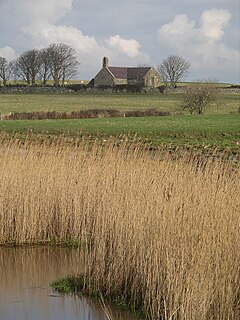Llanfaglan
| Llanfaglan | |
|---|---|
 St Baglan's church, Llanfaglan |
|
| Llanfaglan shown within Gwynedd | |
| OS grid reference | SH469602 |
| Community | |
| Principal area | |
| Country | Wales |
| Sovereign state | United Kingdom |
| Post town | CAERNARFON |
| Postcode district | LL54 |
| Dialling code | 01286 |
| Police | North Wales |
| Fire | North Wales |
| Ambulance | Welsh |
| EU Parliament | Wales |
| UK Parliament | |
| Welsh Assembly | |
Llanfaglan is a parish in Gwynedd, north-west Wales. It lay in the medieval cwmwd of Is Gwyrfai.
Llanfaglan is a medieval parish bordering with the parish of Llanbeblig, Caernarfon, on the shore of the Menai Strait and Traeth y Foryd.
The church in Llanfaglan, St Baglan's (Grid reference SH 455 606) stands alone in the middle of a field and is now owned by the Friends of Friendless Churches. In 2005, it was discovered that the church and the older part of the cemetery were part of a pentagonal enclosure. The period of this enclosure is not known as it is the only one of this type know of in Europe up to now. A 5th or 6th Century gravestone inscribed with Fili Lovernii Anatemori, has been reused as a lintel over the door. This was the gravestone of Anatemarios, mab Loverniws. Although the Christian church probably dates from the 13th century, additions date from the 17th century as do the internal fittings. The church remains consecrated and is still in occasional use.
The church is usually open during the European heritage Open Door weekends in September, where a local historian is on hand to provide visitors with the history of the church, in either Welsh or English.
Next to the church in an open field once stood a well known as Ffynnon Faglan or Baglan's Well. Llanfaglan was said to be the holy place of St. Baglan yg Coet Alun and the erection of the well was attributed to him. The water in the well was said to have healing powers. The afflicted area would be bathed and then into the well would be dropped a pin. The well was used also for the cure of warts. The wart would be washed, pricked with a pin and the pin then thrown into the well. The well was subsequently dredged in the nineteenth century (two basins of bent pins were recovered) and no longer exists. A font is carved into the rock within a few yards of the site of the well.
...
Wikipedia

